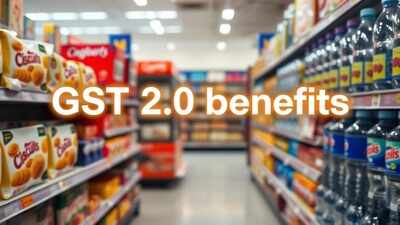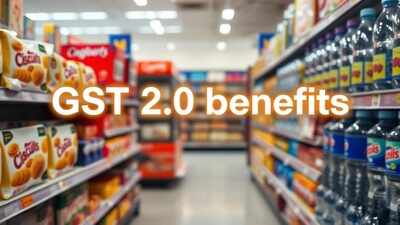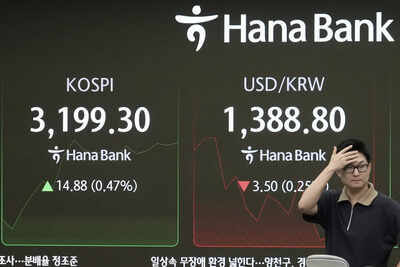Nostalgic Rs 5 biscuits back? This is how FMCG firms will pass GST 2.0 benefits—It’s not cutting prices!

Repriced and repacked! Your biscuit, shampoo and water bottles will now be bigger!Remember when a Rs 5 Parle-G pack or a Rs 20 Bisleri bottle felt like such a steal, giving you more than you expected?Those days could soon be back as FMCG companies are planning to bring back these familiar price points by mid-November, with slightly bigger packs to match the new GST rules.
Bigger sizes instead of lesser prices
After the September 22 GST rate cuts, many items had shifted to awkward new prices as there was no clarification from the government about increasing weights. A Rs 5 Parle-G pack became Rs 4.45, a Rs 1 candy fell to 88 paise, and a Rs 2 shampoo sachet went down to about Rs 1.77, leaving shoppers frustrated.The government then issued clarification to some FMCG manufacturers allowing them to pass on the GST rate cut benefits by increasing the weight of the packets instead of reducing prices.Industry executives told ET that now that officials from the Central Board of Indirect Taxes and Customs gave a verbal clarification in meetings with FMCG firms, they can start fresh production by next week with new packets at the already popular prices, but with a 6% to 12% increase in quantity.“Over the next few days, companies will roll out new packs at the popular price points and increased weight,” said Mayank Shah, vice president at Parle Products. Snack production has already restarted, while other categories are modifying pack sizes. For biscuits, the weight will go up by 11–12%.Angelo George, chief executive of Bisleri International, said, “The current price points are inconvenient for consumers,” adding that the companies will soon go back to old popular prices but with higher volume.
Popular prices —Win-win for both!
After the initial GST cut, many products saw temporary price drops: Mondelez revised Bournvita from Rs 30 to Rs 26.69, Oreo from Rs 10 to Rs 8.90, and Gems and 5Star Rs 20 packs to Rs 17.8. Bisleri reduced 500 ml bottles from Rs 10 to Rs 9 and 1-litre bottles from Rs 20 to Rs 18. Retailers often rounded off prices or returned change with small confectionery packs, while digital payments allowed exact amounts.Tarun Arora, chief executive of Zydus Wellness, which makes Complan and Glucon-D, said that popular price points are a win-win for consumers and small retailers alike. Arora said that they make sense from a consumer perspective and are easier for marketing as well.“”It’s still early days, but companies might respond by launching new products at magic price points or even consider reaching out to regulators for guidance or relief,”” he explained.
Many await official clarification
Back in 2017, several FMCG firms were fined by the National Anti-Profiteering Authority for allegedly failing to pass on GST benefits to consumers. This time, however, government officials have clarified that companies will not face penalties if they reintroduce popular price points by increasing pack weight or volume.Dairy major Amul, however, is taking a cautious approach. Jayen Mehta, managing director of the Gujarat Cooperative Milk Marketing Federation, which markets Amul products, said, “The government’s intent was to lower pricing and we will follow it in letter and spirit. We do not intend to revise the prices and increase grammage because consumers will not get the intended benefit.”Prashant Peres, managing director at Kellanova India and South Asia, told ET last month that price tags in between the “magic” points had caused inconvenience for the industry. “In the short term, there will be some slashing of prices that we will do, or many others will do, because we just can’t turn around the supply chain fast enough. But in the long term, it will be grammage, and we will go to those price points,” he said.
GST 2.0 cuts and benefits
The GST Reforms 2025 mark a major overhaul of India’s indirect tax system, aiming to simplify taxation, reduce the burden on citizens, and stimulate business growth. The reform introduces a new two-slab structure of 5% and 18%, replacing the previous four-tier system. Luxury and sin goods such as tobacco, pan masala, aerated drinks, and high-end cars will now be taxed at 40%, ensuring fairness while maintaining government revenue.The reform significantly reduces GST on essential household items and services and the benefits of these reforms extend across the economy.The government has directed multiple times that the companies must pass on the benefits to the consumers. Earlier, Union finance minister Nirmala Sitharaman said that the Centre is working on a package to provide relief to exporters affected by US tariffs.In an hour-long interview, she told TOI the GST reforms, which came on PM Modi’s directions, focused on ensuring the benefits of rate reduction go to the common man, farmers and small businesses. She said ministries were already working with the industry to ensure that the gains are fully transferred to consumers and pointed to several companies, such as state-run insurers and a leading Indian auto company, announcing plans to reduce prices.While addressing a press conference on ‘GST Bachat Utsav’, Sitharaman also said in quite a few cases, a “more-than-expected” price reduction due to GST reforms has been passed on to end consumers.“We are convinced that on every such items the benefits are being fully passed on to consumers,” she added. The government has also introduced a helpline and an online portal for consumers to register a complaint, in case they are not receiving the benefits of the rate cuts.






